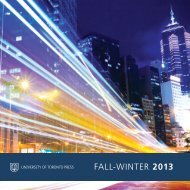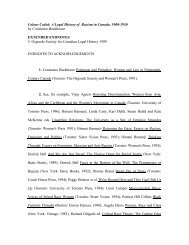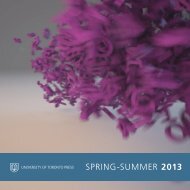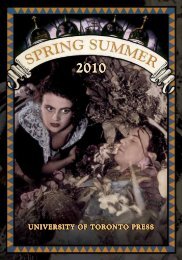Classics, Medieval & Renaissance 2012 - University of Toronto ...
Classics, Medieval & Renaissance 2012 - University of Toronto ...
Classics, Medieval & Renaissance 2012 - University of Toronto ...
Create successful ePaper yourself
Turn your PDF publications into a flip-book with our unique Google optimized e-Paper software.
LITERATURE<br />
NEW<br />
The Emblematics <strong>of</strong> the Self<br />
Ekphrasis and Identity in <strong>Renaissance</strong> Imitations <strong>of</strong> Greek Romance<br />
Elizabeth B. Bearden<br />
The ancient Greek romances <strong>of</strong> Achilles Tatius and<br />
Heliodorus were widely imitated by early modern<br />
writers such as Miguel de Cervantes, Philip Sidney,<br />
and Mary Wroth. Like their Greek models, <strong>Renaissance</strong><br />
romances used ekphrasis, or verbal descriptions <strong>of</strong><br />
visual representation, as a tool for characterization.<br />
The Emblematics <strong>of</strong> the Self shows how the women,<br />
foreigners, and non-Christians <strong>of</strong> these tales reveal<br />
their identities and desires in their responses to the<br />
‘verbal pictures’ <strong>of</strong> romance.<br />
Engaging and rigorous, The Emblematics <strong>of</strong> the<br />
Self breaks new ground in understanding hegemonic<br />
and cosmopolitan European conceptions <strong>of</strong> the<br />
‘other,’ as well as new possibilities for early modern<br />
identities, in an increasingly global <strong>Renaissance</strong>.<br />
Elizabeth B. Bearden is an assistant pr<strong>of</strong>essor in<br />
the Department <strong>of</strong> English at the <strong>University</strong> <strong>of</strong><br />
Wisconsin-Madison.<br />
‘This rigorous comparative study <strong>of</strong> the “emblematics<br />
<strong>of</strong> the self” is poised to make a major contribution<br />
to the fields <strong>of</strong> <strong>Renaissance</strong> studies, rhetorical studies,<br />
gender studies, and postcolonial studies.’<br />
Bernadette Andrea, <strong>University</strong> <strong>of</strong> Texas at San Antonio<br />
272 pp / 8 illustrations / 6 x 9 / January <strong>2012</strong><br />
Cloth 978-1-4426-4346-8 $65.00 (£42.00)<br />
NEW<br />
Colonial Virtue<br />
The Mobility <strong>of</strong> Temperance in <strong>Renaissance</strong> England<br />
Kasey Evans<br />
Colonial Virtue is the first study to focus on the role<br />
played by the virtue <strong>of</strong> temperance in shaping ethical<br />
debates about early English colonialism. Kasey Evans<br />
tracks the migration <strong>of</strong> ideas surrounding temperance<br />
from classical and humanist writings through to sixteenth-<br />
and seventeenth-century applications,<br />
emphasizing the ways in which they have transcended<br />
the vocabularies <strong>of</strong> geography and time.<br />
Colonial Virtue <strong>of</strong>fers fresh insights into how<br />
English <strong>Renaissance</strong> writers used temperance as a<br />
privileged lens through which to view New World<br />
morality and politically to justify colonial practices in<br />
Virginia and the West Indies. Beautifully written and<br />
deeply engaging, Colonial Virtue also models an<br />
expansive methodology for literary studies through<br />
its close readings and rhetorical analyses.<br />
Kasey Evans is an assistant pr<strong>of</strong>essor in the Department<br />
<strong>of</strong> English at Northwestern <strong>University</strong>.<br />
‘Colonial Virtue has changed the way that I read<br />
texts that focus on, or even invoke, the virtue <strong>of</strong><br />
temperance. Kasey Evans’s analyses are detailed<br />
and thoughtful, and her close readings are both<br />
deeply engaged and deeply engaging.’<br />
Valerie Forman, New York <strong>University</strong><br />
264 pp / 15 illustrations / 6 x 9 / January <strong>2012</strong><br />
Cloth 978-1-4426-4359-8 $60.00 (£40.00)<br />
NEW<br />
Magical Imaginations<br />
Instrumental Aesthetics in the English <strong>Renaissance</strong><br />
Genevieve Guenther<br />
In the English <strong>Renaissance</strong>, poetry was imagined to<br />
inspire moral behaviour in its readers, but the efficacy<br />
<strong>of</strong> poetry was also linked to ‘conjuration,’ the theologically<br />
dangerous practice <strong>of</strong> invoking spirits with<br />
words. Magical Imaginations explores how major<br />
writers <strong>of</strong> the period – including Spenser, Marlowe,<br />
and Shakespeare – negotiated this troubling link<br />
between poetry and magic in their attempts to<br />
transform readers and audiences with the power <strong>of</strong> art.<br />
Through analyses <strong>of</strong> texts ranging from sermons<br />
and theological treatises to medical tracts and legal<br />
documents, Genevieve Guenther sheds new light on<br />
magic as a cultural practice in early modern England.<br />
With this new understanding <strong>of</strong> early modern magic<br />
– a fresh context for compelling readings <strong>of</strong> classic<br />
literary works – Magical Imaginations reveals the<br />
central importance <strong>of</strong> magic to English literary history.<br />
Genevieve Guenther is an independent scholar with<br />
a PhD from the <strong>University</strong> <strong>of</strong> California at Berkeley.<br />
‘I recommend this book highly for its incisiveness<br />
and extraordinary scholarship.’<br />
John D. Cox, Hope College<br />
Approx. 184 pp / 6 x 9 / March <strong>2012</strong><br />
Cloth 978-1-4426-4241-6 $60.00 (£40.00)<br />
26 <strong>University</strong> <strong>of</strong> <strong>Toronto</strong> Press
















